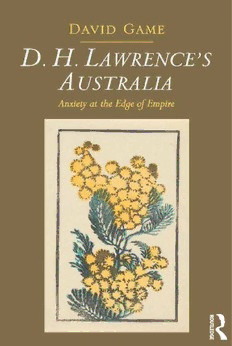
D.H. Lawrence’s Australia: Anxiety at the Edge of Empire PDF
Preview D.H. Lawrence’s Australia: Anxiety at the Edge of Empire
D. H. Lawrence’s austraLia To my parents Michael and Elizabeth Game D. H. Lawrence’s australia anxiety at the edge of empire DaviD Game Australian National University, Australia First published 2015 by Ashgate Publishing Published 2016 by Routledge 2 Park Square, Milton Park, Abingdon, Oxon OX14 4RN 711 Third Avenue, New York, NY 10017, USA Routledge is an imprint of the Taylor & Francis Group, an informa business Copyright © David Game 2015 David Game has asserted his right under the Copyright, Designs and Patents Act, 1988, to be identified as the author of this work. All rights reserved. No part of this book may be reprinted or reproduced or utilised in any form or by any electronic, mechanical, or other means, now known or hereafter invented, including photocopying and recording, or in any information storage or retrieval system, without permission in writing from the publishers. Notice: Product or corporate names may be trademarks or registered trademarks, and are used only for identification and explanation without intent to infringe. British Library Cataloguing in Publication Data A catalogue record for this book is available from the British Library The Library of Congress has cataloged the printed edition as follows: Game, David. D.H. Lawrence’s Australia: anxiety at the edge of empire / by David Game. pages cm Includes bibliographical references and index. ISBN 978-1-4724-1505-9 (pbk) 1. Lawrence, D. H. (David Herbert), 1885–1930—Criticism and interpretation. 2. Australia—In literature. I. Title. PR6023.A93Z62926 2015 823’.912—dc23 2014046390 ISBN: 9781472415059 (hbk) ISBN: 9781315575766 (ebk) “… and in australia mimosa, that they call wattle, and sharp-tongued strange heath-flowers.” (D. H. Lawrence, “Flowery Tuscany”) This page has been left blank intentionally Contents Acknowledgements ix List of Illustrations xi References and Abbreviations xiii Chronology xvii Prologue xxi Introduction 1 1 Darwinism and Lawrence’s Quest for Regeneration: “A New Conception of What it Means, to Live” 9 2 Regeneration, the Rejection of Eugenics and Rananim in Australia 35 3 Lawrence Decides to Travel to Australia 65 4 Imagining Australia: “The Vicar’s Garden,” The White Peacock, The Daughter-in-Law, “The Primrose Path,” The Lost Girl, Aaron’s Rod and Mr Noon 73 5 “Pommy,” “Pommygranate” and “Pommigrant” in Kangaroo: Mr and Mrs Somers, the Amateur Emigrants 97 6 Aspects of Degeneration in Kangaroo – “A Novel, Shot with a Wayward Beauty” 125 7 “Kangaroo” and the Spirit of Australia 153 8 The Race for the Bush: The Australian Aboriginal Presence and British Race Regeneration in Kangaroo and The Boy in the Bush 159 9 Matriarchy, Mates and Bigamy in The Boy in the Bush 195 10 The Aristocrat in the Bush: Some Textual Origins for the Questing Hero in The Boy in the Bush 217 11 Out of Place: Colonial Australians in St. Mawr 239 12 Last Words: “Preface to Black Swans,” “The Hand,” Lady Chatterley’s Lover, “Eve in the Land of Nod,” P. R. Stephensen – Mandrake Press and “Introduction to Pansies,” Mimosa Letters 255 Conclusion 283 Bibliography 285 Index 305 This page has been left blank intentionally Acknowledgements I owe particular thanks to Paul Eggert, Christopher Pollnitz and Bruce Steele, who have provided critical comment on my work, generously provided me with resources and suggestions, and offered their friendship over many years. I thank Joseph Davis for his hospitality and for sharing his knowledge of Thirroul and the places visited by D. H. Lawrence. I thank the head of the School of Literature, Languages and Linguistics, Australian National University, Catherine Travis, and her predecessors – Jane Simpson, Rosanne Kennedy, Jill Julius-Matthews and Jacqueline Lo – for maintaining my affiliation with the school in its various forms since 2009. I thank Livio Dobrez and Ian Higgins, who supported this book from its inception, as well as Simon Haines, Gillian Russell and the late Iain Wright. I thank my cousin, Philip Butterss, for his enthusiasm, generosity and feedback on early work, and my daughter Helena Game for her tireless editorial assistance. I am grateful to have received an Australian Postgraduate Award, which enabled me to undertake postgraduate studies. I would like to acknowledge the vibrant community of Lawrence scholars in the D. H. Lawrence societies around the world, whom I have been privileged to meet at the international D. H. Lawrence conferences since 2003. In particular I thank Andrew Harrison, Bethan Jones, the late Mark Kinkead-Weekes, Ronan McGinty, the late Peter Preston, Nancy Paxton and John Worthen for their encouragement, hospitality and friendship. I thank Eleanor Green, editor of the D. H. Lawrence Review, for permission to draw on “Aspects of Degenerationism in D. H. Lawrence’s Kangaroo,” D. H. Lawrence Review 32–3 (2003–2004), and Sue Reid, editor of the Journal of the D. H. Lawrence Society, for permission to draw on “Out of Place: Colonial Australians in St. Mawr,” Journal of D. H. Lawrence Studies 2:3 (2011). I gratefully acknowledge the permission of the editors to rework this material. I thank Beverly Mackay for permission to reproduce a postcard sent by D. H. Lawrence to her grandmother, Mrs Laura Forrester, and to reproduce a photograph of the Lawrences, her grandmother, and Mr and Mrs Marchbanks, taken by her grandfather, A. D. Forrester. I thank Pollinger Limited for permission to quote from the letters and works of D. H. Lawrence. I am grateful to individuals at the following institutions and organisations who enabled me to access and reproduce material held in collections: Alexander Turnbull Library; State Library of Western Australia; National Gallery of Australia; National Library of Australia; Harry Ransom Center, University of Texas, Austin; Lilly Library, Indiana University; and World Ship Society of Victoria. I would like to thank friends who have maintained an interest in this project over the years, particularly Paula Davidson, Mary Fanning, Marina Lewis, Neil Longmore and Geoffrey Potter. I thank colleagues at the Commonwealth
